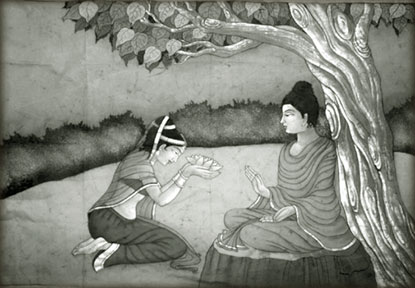Arahat Bhikkuni Ambapali
By Premasara Epasinghe
During the period when Gautama Buddha in India over 2,500 years ago,
the womenfolk occupied a very servile place. Before the advent of the
Blessed One, the Brahamin hegemony, had relegated women to a lower
status. They were treated like slaves. The Indian society at that time
considered the birth of a daughter a misfortune, disaster or ill-luck.
When King Kosala was in the presence of the Buddha, an emissary told him
that Queen Mallika had given birth to a daughter. The King was
distraught. The Buddha said, “Oh King! Do not be perturbed. A female
child may prove, sometimes better than a baby boy.
Elevated
Among the religious leaders in the world, it was the Buddha who
elevated the status of women and revolutionised their lives in India.
The Buddha always stood for the moral and spiritual regeneration of all
men and women and emancipated them from the never-ending Samsaric
journey. He helped them attain eternal bliss of Nibbana. The
establishment of Bhikkhuni Sasana can be considered the beginning of
their liberation. Queens, princesses, noble women, low-caste women,
ordinary women, the rich and the poor alike from all strata of society
entered the Bhikkhuni Order. The Buddha never cared for caste, creed or
gender. He always gave equal opportunities to women. He never discarded
them.
 The story of the Enlightened Bhikkhuni Ambapali, is interesting.
Before entering the Bhikkhuni Order she practised the oldest profession
in the world. There were seven enlightened Bhikkhunis including
Ambapali, who attained the deathless state or Arahatship after listening
to the enlightened Bhikkhunis such as Abhayamata, Sumangala Mata, Sama,
Nanduttara, Vionala and Kumara Kassapa Mata. The story of the Enlightened Bhikkhuni Ambapali, is interesting.
Before entering the Bhikkhuni Order she practised the oldest profession
in the world. There were seven enlightened Bhikkhunis including
Ambapali, who attained the deathless state or Arahatship after listening
to the enlightened Bhikkhunis such as Abhayamata, Sumangala Mata, Sama,
Nanduttara, Vionala and Kumara Kassapa Mata.
The history of Ambapali can be traced to the Sikhi Buddha. She was a
Bhikkhuni during that time. Her wish was to become an Enlightened
Bhikkhuni during a future Buddha's period. One day, when the Bhikkhunis
were going round worshipping a shrine, an old Bhikkhuni coughed out
phlegm. Ambapali lost her temper. She angrily shouted at the old
Bhikkhuni the courtisan has spat out on this pathway”. As a result of
that bad utterance and unwholesome words, she was born a woman, during
Gautama Buddha's time, and led a life of a prostitute.
Sweet
There was a sweet little baby girl under a shady mango tree, in the
Jivaka Mango Grove. The gardener carried the lovely little one, and the
foster parents adopted her. Later the great physician Jivaka, saw this
pretty beautiful maiden who resembled an angel and informed King
Bimbisara about her. The young king fell in love with Ambapali and
supported her parents. She was taught singing and dancing. There were
many princes and nobles who were keen to marry her. She had pleased
Bimbisara for a week. She bore a baby boy. who was adopted by a poor
woman. She became a courtesan eventually.
Many years passed. His son Wimala who was adopted by a poor woman,
entered the Buddhist Order as Wimala Kondanna. One day, when Ambapali
was admiring the natural beauty of the park, she saw a young Bhikkhu
seated under a shady tree. He called Ambapali “Amma, (mother) I am your
son. When I was a child, everyone treated me as a whore's son. I felt
ashamed and joined the Order, as Wimala-Kondanna.
After listening to the Bhikkhu, she started crying and gave up her
profession. The son preached her the sublime Dhamma and explained her
that beauty fades away, and that this life is subjected to decay and
death. She realised the truth. She returned to her mansion in deep
thought. She distributed her wealth among her servants and became a
devotee of the Blessed One. She offered alms to Buddha and Bhikkhus. The
Buddha realising that she was fortunate to be an Enlightened Bhikkhuni,
granted her permission to enter the Bhikkhuni Sasana.
In Therigatha she expressed her joy in full liberation.
“Once I was proud of my lovely hair, black-rainbow like eyelashes. I
had beautiful eyes which enticed kings. Now, I have sunken sockets,
forehead wrinkled and ugly. At present, I have dull, grey lustreless,
decayed teeth. The Buddha preached the transient nature and foulness of
the body. When I look back at my beauty, ugly changes are now visible. I
have realised the truth - the impermanence of life. Now, I strive hard
to reach the deathless state - the bliss of Nibbana.
|



